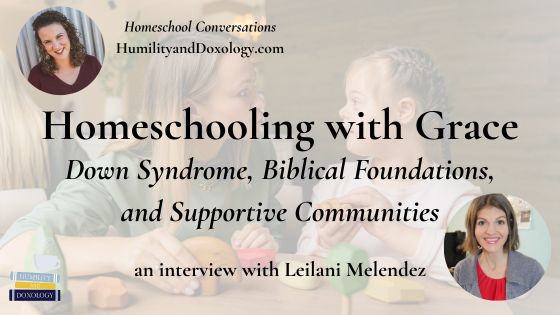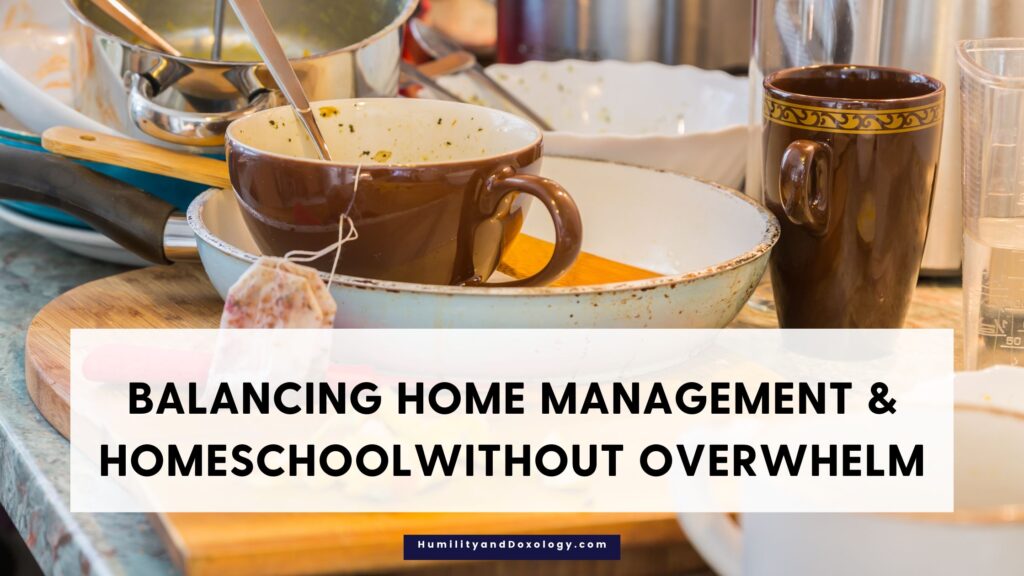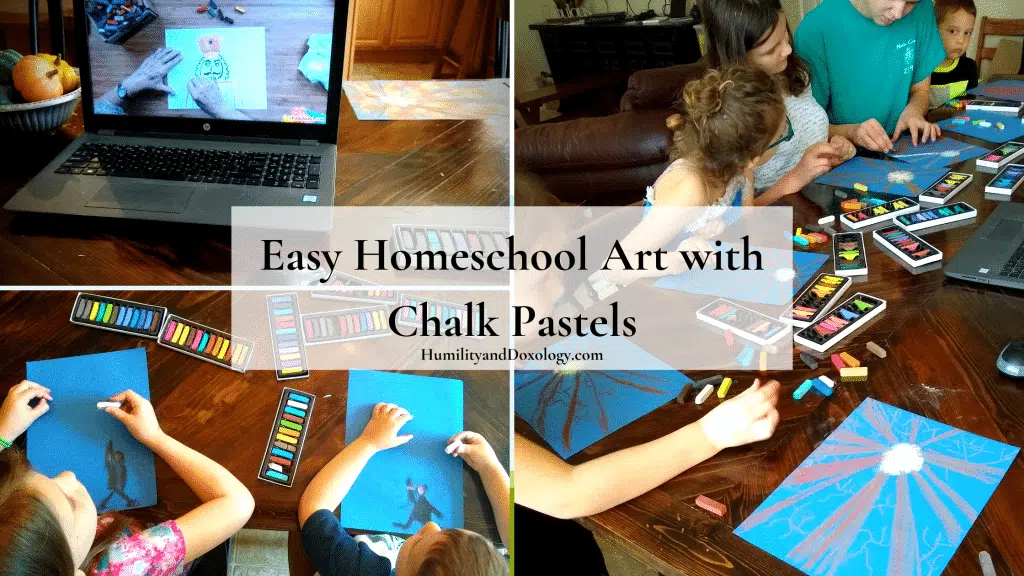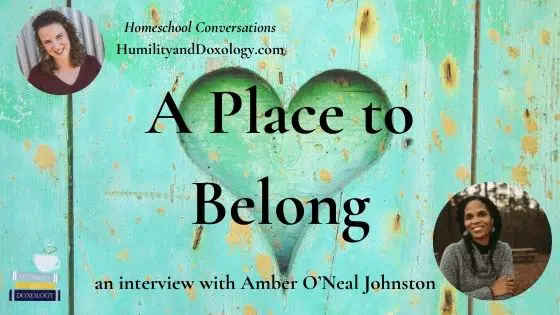Homeschooling offers families the beautiful opportunity to build strong relationships, nurture character, and tailor education to the needs of each child. For parents homeschooling children with learning differences like Down syndrome, this journey comes with both unique challenges and deep rewards.
In this inspiring conversation, I sat down with Leilani Melendez (a homeschooling mom of four, experienced classroom teacher, and creator of Living with Eve) to talk about her family’s homeschool journey, adapting academics with grace, and finding supportive community.
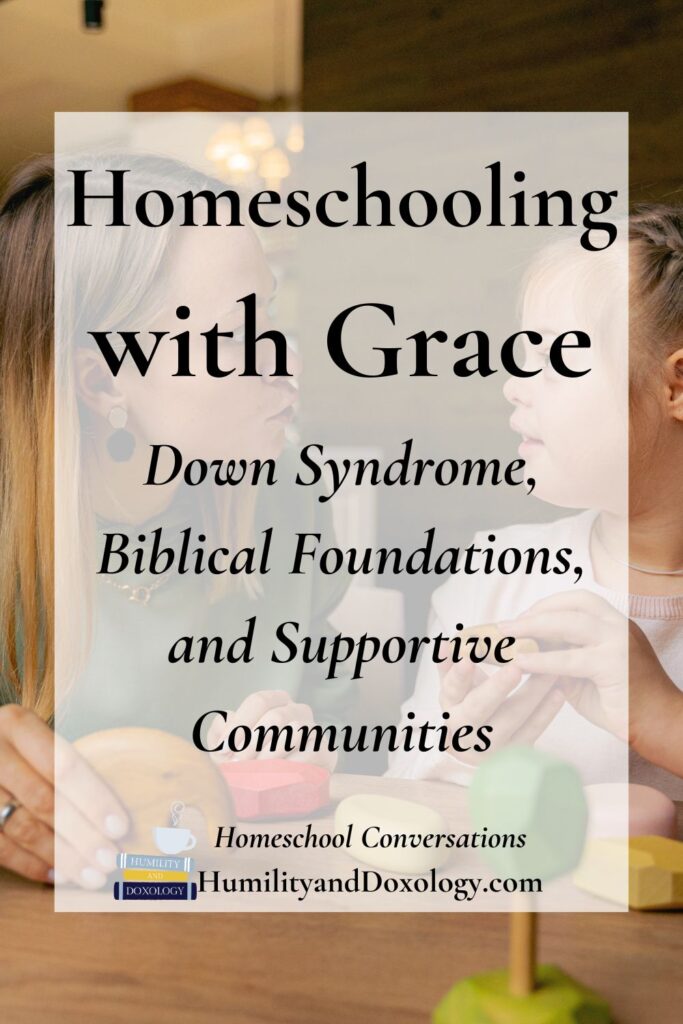
{This post contains paid links. Please see disclaimer.}
- Leaning into Faith and Family
- Shifting Perspectives: From Academics to Whole-Person Learning
- Homeschooling a Child with Down Syndrome
- Adapting Homeschool Lessons with a Biblical Foundation
- Encouragement for Homeschooling Parents Just Starting Out
- Balancing Therapies, Appointments, and Family Life
- Building and Being Supportive Communities
- Books, Breaks, and Practical Tips
- Key Takeaways
- You may also enjoy:
- Check out all the other interviews in my Homeschool Conversations series!

Leaning into Faith and Family
Leilani’s passion for education began long before homeschooling. A classroom teacher for a decade, she saw firsthand the gaps in how children with special needs were supported in traditional school settings. That experience was a turning point.
“I just did not like how the special needs community was treated in the public school system… it helped spark that idea that these kids need more—not just my kids, all kids need more.”
This realization eventually led her to leave the classroom and embrace homeschooling, combining her teaching background with her faith and family vision.
Shifting Perspectives: From Academics to Whole-Person Learning
Leilani shares that one of the biggest changes in her philosophy of education was learning to move beyond a narrow academic focus.
“When you take your child home to homeschool, it’s more about the relationship that you have with your child, the relationship that they have with the Lord… It’s a whole person approach instead of just focusing on academics.”
Seasoned homeschool parents poured into her early on, reminding her that homeschooling is not just “school at home,” but an opportunity to grow together in faith and character.

Homeschooling a Child with Down Syndrome
Leilani’s youngest daughter, Naomi, was born with Down syndrome. Homeschooling her has reshaped how Leilani views learning and life.
“One of the benefits has been, it’s forcing me to slow down with every aspect of our life… It’s also this idea of throwing the state standards out the window, which is really nice.”
She emphasizes the freedom to move at her daughter’s pace, embrace repetition, and build a supportive “dream team” of therapists, co-op teachers, and mentors.
“If we think that we can do everything on our own, I feel like that’s prideful. We’re not meant to be by ourselves doing things on our own.”

Adapting Homeschool Lessons with a Biblical Foundation
For Leilani, homeschooling is deeply rooted in faith. She integrates biblical truths naturally throughout their learning days.
“Nothing in education is even possible without our Creator. I always try to slow down and bring it back to that.”
This might look like using a simple book about shapes to talk about God’s creation, going on nature walks, praying during lessons, or incorporating music and sibling involvement to build character and connection.
Encouragement for Homeschooling Parents Just Starting Out
For parents considering homeschooling their child with Down syndrome and feeling overwhelmed, Leilani offers honest encouragement.
“It’s not super easy. I’m not gonna lie… but it is going to take a lot of work on your part and a lot of humility.”
She reminds families to seek community, use resources, and embrace humility as they grow.
“The biggest thing is just being humble and keep learning and find your community.”
Balancing Therapies, Appointments, and Family Life
“I do honestly think the first step really just comes down to a lot of prayer and understanding that God’s going to fill in the gaps where I can’t.”
Leilani shares practical strategies like “car schooling” during appointments, trusting older kids with responsibility, and embracing flexibility while letting go of perfection.
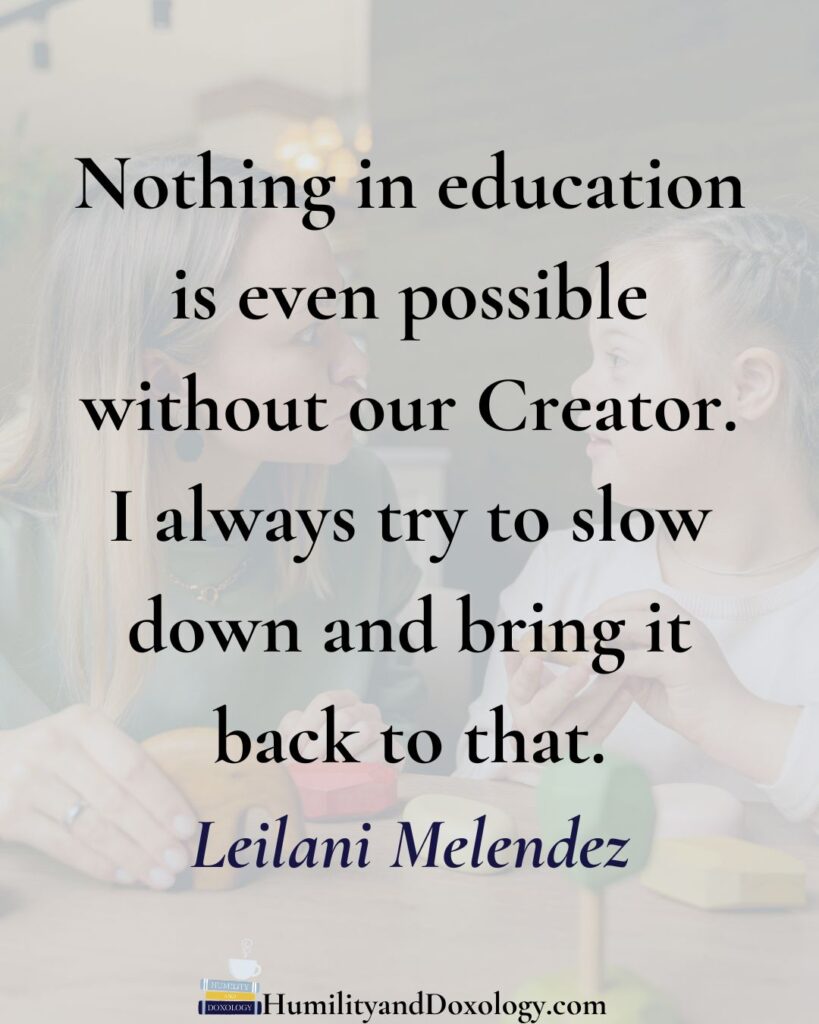
Building and Being Supportive Communities
“Allowing the kids to lead the way… the kids don’t always see that discrimination.”
Leilani encourages families to seek out community in churches and homeschool groups—and for fellow homeschoolers to ask questions, listen well, and show up in meaningful ways for families with special needs.
Books, Breaks, and Practical Tips
Leilani is currently reading Resilient Kids by Dr. Kathy Koch as part of her youth mental health coach training.
Her best tip for turning around a rough homeschool day?
“Let everybody just have their break and leave each other alone for an hour… or we’ll play a game, turn on music, or even go get ice cream.”
Key Takeaways
- Homeschooling offers freedom to teach the whole child—not just academics.
- Leilani’s experience in the classroom shaped her decision to homeschool.
- Slowing down is key when teaching children with learning differences.
- Throwing out rigid standards allows for more individualized learning.
- Faith is woven naturally into daily lessons and conversations.
- Community and humility are essential support pillars.
- Therapies and education can be integrated creatively (e.g., car schooling).
- Siblings play a meaningful role in building empathy and support.
- Supportive homeschool communities are built through listening and asking questions.
- Sometimes, the best fix for a hard day is a break—or ice cream.
You may also enjoy:
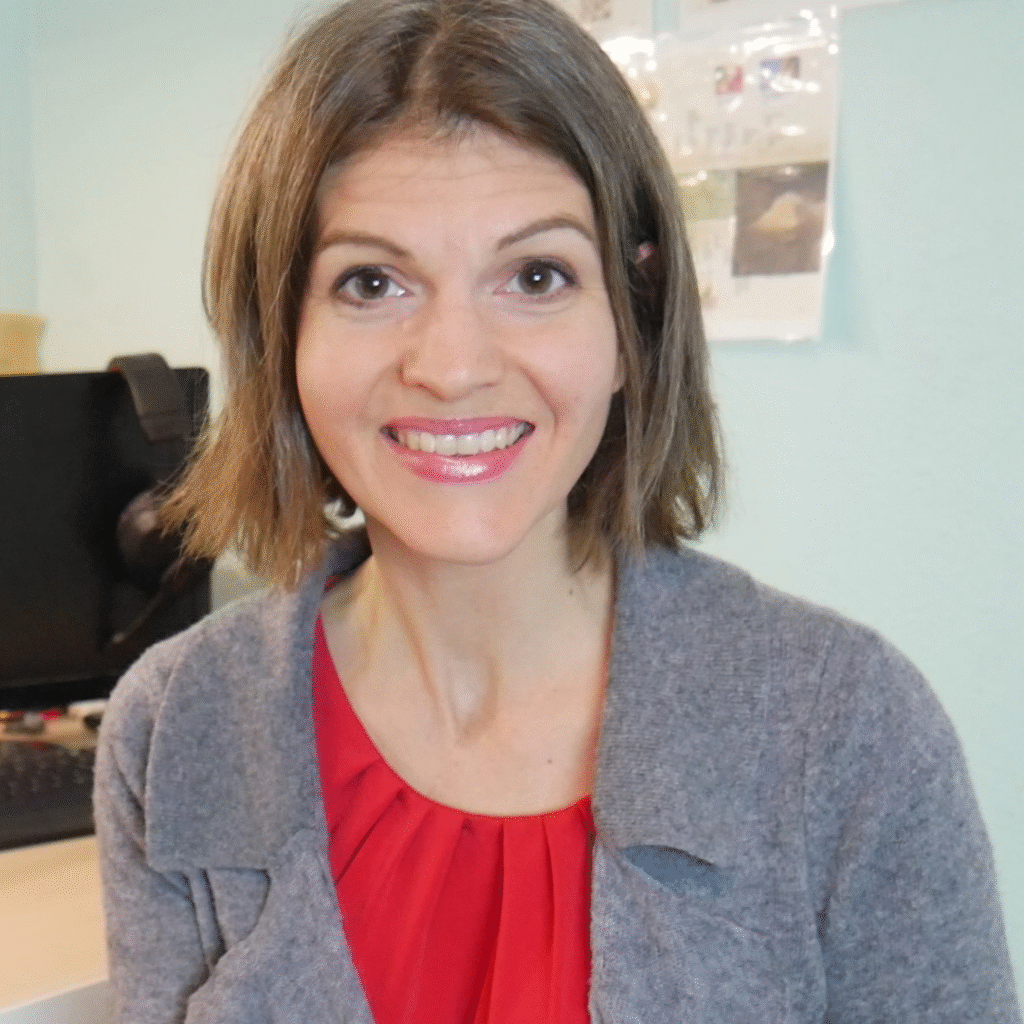
Leilani Melendez is a homeschooling mom of four, experienced classroom teacher, and creator of the YouTube channel Living With Eve, where she shares encouragement, resources, and real-life tips for homeschool families. She offers personalized homeschool consultations and portfolio evaluations, helping parents feel confident and equipped—especially those navigating homeschooling children with learning differences like Down syndrome. Leilani is also the author of Freedom To Learn: Choosing Your Path to Homeschool Victory, a practical and inspiring guide for both new and seasoned homeschoolers. Inspired by her own journey, she creates Christ-centered Learning With God packets that blend academic skills with biblical truths, available at leilanimelendez.com.
Check out all the other interviews in my Homeschool Conversations series!
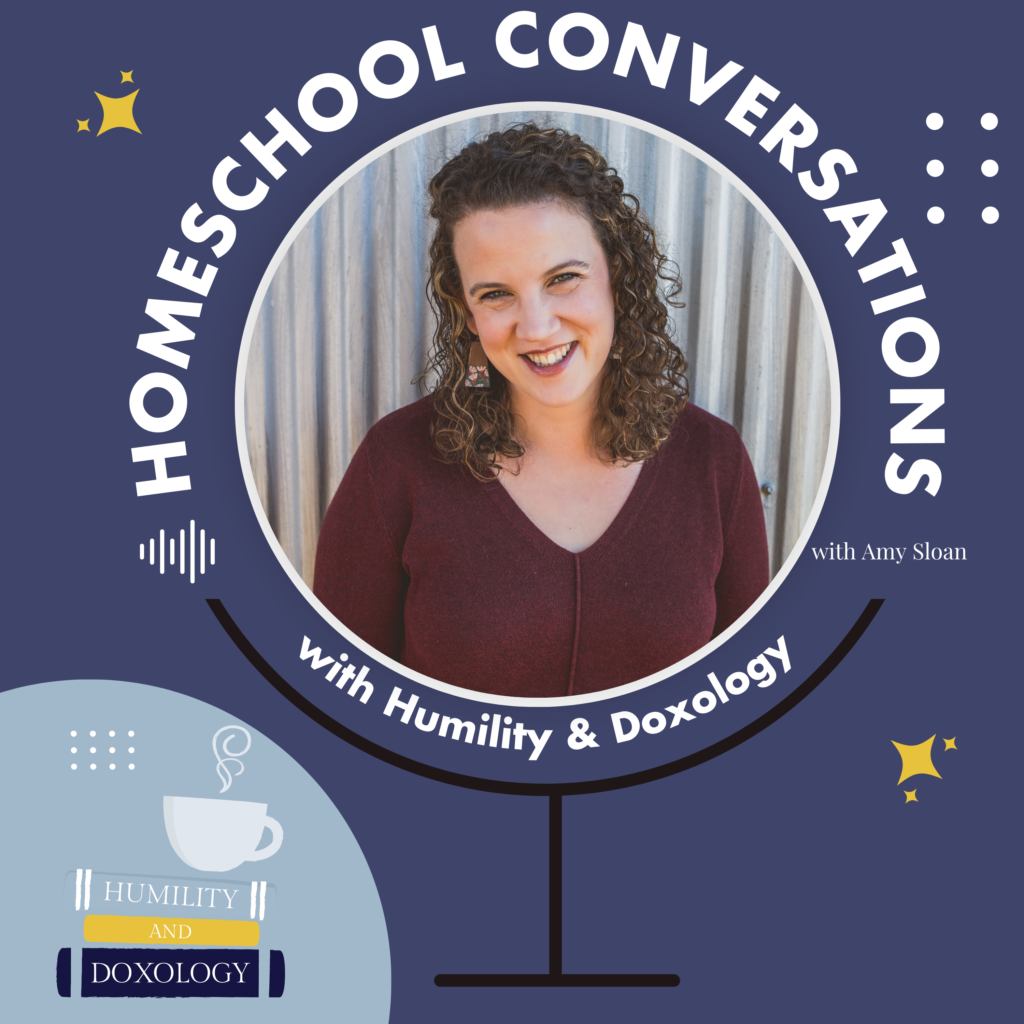
Amy Sloan: Hello friends, I am delighted to be joined today by Leilani Melendez, who is a homeschooling mom of four, an experienced classroom teacher, and the creator of the YouTube channel Living with Eve, where she shares encouragement, resources, and real-life tips for homeschool parents and families. She offers personalized homeschool consultations and portfolio evaluations, helping parents feel confident and equipped, especially those navigating homeschooling children with learning differences like Down syndrome. Leilani is also the author of Freedom to Learn, Choosing Your Path to Homeschool Victory, a practical and inspiring guide for both new and seasoned homeschoolers. So there is your official bio, but can you please tell us a little bit about yourself, your family, and how you got started homeschooling?
Leilani Melendez: I feel like you just almost hit everything on the head. But yes, so I started off as a homeschool, or not homeschool, I’m sorry, classroom teacher for both public and private school, and I did that for 10 years. And then when I started to have children, I realized that I did not want them in this environment. I was not very happy with the fact, you know, obviously, because it was not very faith-based in the public school system. I didn’t like how the kids treated each other. I think the turning point for me, actually, ironically, and this was even before I had my daughter with Down syndrome, is I just did not like how the special needs community was treated in the public school system. And it wasn’t their fault, it was just they didn’t have enough support, they didn’t have enough personnel, the main special needs teacher, she was off doing paperwork and in meetings and all these things that she had to do for her job that she couldn’t actually be in the classroom with the children. And I just saw a lot of things that just didn’t sit right with me. And it helped spark, you know, spark that idea that, you know, there’s, these kids need more, not just my kids, and all kids need more. And so that’s one of the reasons why I like to help and support parents through all of this journey. I did end up doing, I’ve done everything in the school, a classroom school, I’ve done public and private. So I did everything from teaching music, to drama, to musical theater, to Title I, math and language arts, specifically mathematics, because I am more of a math person. And then, but also language arts, for sure. The Title I, I don’t know if, I’m not sure if every state has Title I, but it is working with kids that have learning differences, and pulling them out more one-on-one type tutoring through the day. And then, then that’s when I decided to homeschool and I resigned. And of course, I love teaching. And I would, I would do it for free, like, but that’s not an option, I gotta, you know, make money. But I love teaching. I love it so much that I ended up, and I was so drawn to the homeschool community, and the people in the homeschool community. And you know, when you’re drawn to something, you just love it and you want to love on it. And so before my kids were even school age, I started working at a home education program where I’ve been actually teaching science for the last 13 years. And of course, I, all these kids, it’s family, because it’s very small and intimate. It’s great. So that’s what I do. And they’ve also gotten me involved doing homeschool evaluations, portfolio reviews. I know in Florida, that’s one of the legal requirements, but I know there’s some other states that do it as well. But I do consultation, consultations nationwide. I’ve done it, I would say worldwide too, because I’ve done it with Canada as well. So yeah, that’s basically it. My youngest daughter was born with Down syndrome. We also have some ADHD diagnosis in our family as well. And of course, you know, a lot of other things come along with that, like sensory processing, anxiety, you know, all of it kind of overlaps each other when you start to, every child’s different anyway. And we do, we do have to cater to them and really learn about their personalities. So yeah, that’s kind of about me.
Amy Sloan: That is great. And I love hearing your heart and desire to support other homeschool families and other parents too. I think that passion for teaching, right, is not just about the children too. It’s about that whole family and the parents as well. I’m really curious in what ways you’ve seen your perspective on homeschooling, maybe your philosophy of education grow and change over your years of teaching.
Leilani Melendez: Yeah. It has a lot because I, you know, I went through the Polk school system and I was trained to be a public school teacher and a classroom teacher. And the focus is very much on academics. There’s a lot of paperwork. There’s a lot of large vocabulary. It’s almost crazy. I’m like, why are you using these words half the time? Because I feel like it’s a way to intimidate others. But anyway, that’s a whole nother conversation. But just, you know, it’s not, academics are important, but it’s not the focus. When you take your child home to homeschool, it’s more about the relationship that you have with your child, the relationship that they have with the Lord, the relationship that they have with other people, and just almost, I almost want to say survival skills, but what kind of skills do they need to be a successful adult? Not only that, like who is it that God made them to be? And it’s a whole person approach instead of just focusing on academics all the time. It’s looking at their personality, getting to know them, grow with them. I think growing with them is the biggest thing because yes, you’re teaching them things, but they’re also teaching you. I’m really big into character development. I know when I started homeschooling, that was not my main focus because I was still in that public school mindset, that little box that they put you in. And I wish I did have some more time to do character development and then input some of the academics with that, but focus more on building relationships. And so I think that just, and also faith-based too, that’s been a big, big, big part. I do feel like now that I, because when I started homeschooling, one of the benefits that I had is when I joined the homeschool home education program, which is basically a homeschool co-op, I had a lot of older women that fed into my life when I was first starting homeschooling. And they shared with me, you know, it’s going to be different than public school. You know, of course, coming out, I’m like, I know what I’m doing. I was a teacher. And I did get a lot of that where people were like, you’re a teacher, you know what you’re doing. But those parents that stepped out and said, hold on, Leilani, this is new. Well, let me share with you what I did as a homeschool mom. They showed me about relationship. They showed me about family, caring, support, and, you know, faith-based, God first, and all of it. And then now as I’ve grown older, I start to appreciate more of what they shared with me. But I also start to see things, you know, with younger, new homeschoolers that are coming in, to the, I guess, to the fold, so to speak, and seeing those same struggles that I had. So it’s just really interesting how I think it’s important for us to listen to the seasoned homeschool parents and the information that they share with us.
Amy Sloan: Yeah, I love that. I think it’s such a valuable gift that homeschooling gives us that we can have that whole person education, right? We’re not just thinking of just the, you know, just the math part of your brain, or just the language arts part of your brain, or even just your brain, right? It’s about the mind, and the soul, and the relationships. And knowing our children so well means that we have such a unique perspective as we educate them. Like, a friend of mine says that homeschooling is parenting intensified, right? And I think that’s sometimes the hardest part of homeschooling, but also the most beautiful part as well. Yeah, yeah, definitely. What are some of the unique benefits and challenges that you have experienced homeschooling your child with Down syndrome?
Leilani Melendez: Okay, so Naomi’s my youngest one, and so she’s eight now, and so we’re still in the process. I have my older kids are teens, and so I’m always thinking about the future in her. But I think with her, one of the benefits has been, it’s forcing me to slow down with every aspect of our life, because unlike my other kids to learn how to read like super fast, she’s taking a really long time to learn how to read. And it’s okay. It’s also this idea of throwing the state standards out the window, which is really nice. It’s like a freedom, so to speak, which in a sense, I almost feel like everyone should be in a sense, not completely. There’s a purpose for them, but don’t live by these state standards. They sometimes become a burden, and then we tend to get legalistic, and then we bring it home with us. And then we’re teaching to the standards instead of teaching to our kids. And so with Naomi, I’ve had to really learn how to teach to her. And by slowing down everything, so back to the idea of reading, teaching her how to read has been this process of repetition and doing it again. And there’s lots of little aspects of it. She doesn’t always retain the information like my other kids did. We have to repeat a lot. We got to try different techniques. And I’m constantly doing, that’s the one thing I do is I’m always reading, and I’m always researching, and I’m always watching tutorials, and I’m always enrolling in some kind of class or online class or talking to people and brainstorming and working with her therapist and constantly saying, okay, she’s really struggling with reading, but she really likes this. What can I do to kind of blend those two together to get it across, but also still keep the relationship with her and also thinking about how the siblings can interact with this. I’m always trying to come up with different ideas and what works, we do again, we repeat. And also not to lose my patience with her too, because we do a lot of repetition. And always trying to find another person that is, like they’re successful in what they do, but she also responds well to them and latching onto that person to see if I can pick up some of those ideas from that person. I don’t know if that answered your question, or if I just went on a tangent.
Amy Sloan: Yeah, no, because I hear the repetition, the ability to move at her pace and see her as a person and not as just in relation to a list of standards, but also creating your own little personal support system, both in person and online with your classes, your own little team that’s working together, which I think is helpful to hear, because there could be a mom listening who has a child with learning challenges, and they feel like, I have to figure this all out on my own. But I can hear right there already, you’re saying, no, even you who’ve been doing this for a while and you have experience working with children with learning challenges, you’re still learning and bringing people around you to help and do it with you.
Leilani Melendez: Yeah, and none of us can do it. If we think that we can do everything on our own, I feel like that’s prideful. We’re not meant to be by ourselves doing things on our own. Yes, we don’t want to put our kids in the public school system, but it’s not because we don’t want them to be around people. There’s plenty of other reasons to come up with why we decided to homeschool our kids besides that. But the nice thing about homeschooling is that we can pick our child’s therapist. We can find a reading coach. That’s why co-ops are so great. We can find someone that can maybe teach them this thing, but we’re still in charge of our child’s education. We still are in charge of everything. We can use ideas from those people and incorporate them into our daily life. They don’t even have to be professionals. They can even just be a parent that’s just really good at what they do because a certificate doesn’t really… I mean, in my opinion, a certificate or a degree or a doctorate or letters behind their name doesn’t make that person automatically an authority. I mean, it’s so tricky. There’s so many parents that can do things better than someone with a PhD can, if that makes sense. Yes, they got that kind of education, but it’s one of those things. I think everybody understands what I’m trying to say.
Amy Sloan: Yes, yes, for sure. Then you pick your own personalized dream team that works well for your unique child and your unique family. So you’ve mentioned already the repetition that’s been important, finding creative ways to combine something that she’s learning with, maybe something she’s interested in to help with those connections moving slowly. But there are some other ways that you would suggest, ways you’ve experienced already or from your research, adapting academic lessons to meet your child’s developmental and learning needs while still keeping a good biblical foundation and helping them grow.
Leilani Melendez: Yeah. One of the other things that I forgot to mention in the previous, which I think does kind of apply to keeping it biblical because I’m really big on character development, allowing her siblings to participate in teaching her things for several reasons. One, I mean, and it is academic and it is biblical. It’s teaching her siblings character and how, you know, patience, they automatically get that patience, not so easily, but it happens. It gives them a different perspective on things and people. I think there’s something to be said about siblings who grow up in a family with a sibling who has a learning difficulty or challenge and they’re helping them to overcome those things and partnering with them through this process, not necessarily like competing with them. They’re having more sensitivity and in the future, they’re going to be more empathetic and sympathetic to adults that are around them. So, you know, building that relationship with their siblings, family coming first, I think that’s really important. I know that my daughter has a special connection when it comes to music and her sister. And I do look at music as being very academic. There’s so much to music. I won’t go on that tangent, but, you know, they each bring in a different set of standards into her learning. And then at the same time, I get a break, which is kind of, it’s nice. Also at the same time, you know, the loving unconditionally, we’re all growing. That’s taught in scriptures all over the place, putting people first before work and academics and stuff like that. Just building that relationship with everyone, academic, more practical things. Okay, so I do think it’s really, I think there’s a lot of good information out there in the academia world. I mean, we can’t deny that there’s skills and techniques and practical things that we could bring in like teaching letters and such. So, you know, for example, you know, reading, there’s always the sight word versus phonics and, you know, looking at the information, you know, between them. What I try to do, I take an account, like I’ll use secular curriculum because sometimes I don’t, they’re like secular books, like there’ll be books about shapes, you know, or books about colors. I mean, it’s secular, but it’s just, it is what it is. Like some people, you know, you don’t always bring God into those things, but you can as a parent. So what I’ll do is we’ll bust open, I wish I had the book up here with me. I was telling myself I should have brought it, but we have a book that we’re working on with shapes and it’s shapes in nature. And so on each picture, it says, you know, like the rain, look at the rain, it falls on the water and makes a circle. And so we’ll talk about, isn’t that amazing what God can actually do? And we’ll have a dialogue and Naomi, yes, God, you know, and then she likes to pray. So we pray all the time throughout the lessons, thanking God for the beautiful rain. So we’re slowing down and not only looking at the book, but also that God created it, God ordained it because nothing in education is even possible without our creator. So I always try to slow down and bring it back to that. Look at the triangle, look at the volcano. Wow, how amazing is a volcano? And God made that. Let’s look at what God made the volcano do. And so we’ll watch videos and wow, look at that. And then it’s the shape of a triangle. Isn’t that cool that God can make shapes like that and that there’s patterns in nature? What else is a triangle? Oh, that leaf is a triangle. Can we find some leaves that God made outside that are triangles? And so like, maybe we’ll go on a nature hunt or something. And I’m very flexible with her because I don’t feel tied to those state standards, but just constantly trying to bring her back to God. Oh, wow, thank you. Thank you for this leaf, that’s a triangle. Thank you, God, for helping us find this. We even apply that to feelings because if you do have a child with a learning difference or a disability, like you find that sometimes getting in touch with your feelings is really, really important. And of course you have to read them. So isn’t it wonderful that God gave us words to describe how happy we are? I’m happy, I’m excited. We can expand our vocabulary that way. And God gave us different words to express ourselves. And sad, what do we do when somebody is sad? Are you sad? Is your sister or in real time, your sister is sad. And so one thing that Naomi has is a lot, a lot of empathy. And that’s just, I think, part of her. I don’t know, I think it is a Down syndrome thing. I don’t, it is what I seem to hear a very familiar across the board. There’s just a lot of empathy and paying attention. And one of the things I’ve noticed with her, because every child that has a learning difference and unique disabilities, they all have, some have fixations. I should say some, not all of them. So every child is different. Some will have fixations where they fixate on things. And sometimes those fixations are very distracting. And so one of Naomi’s fixations is if she sees somebody hurt, whether their arm is broken, whether they get a scratch, it’s scary because if there is an emergency, she loses it. And it’s almost like you need two people to deal with the emergency. One person to hold Naomi back, and then the other person to cater to whoever’s going through the trauma. And it’s very, very difficult where she will have meltdowns. I have to take her out of the room if somebody needs a Band-Aid. So we’ve gotten to this place and it’s a lot, a lot of prayer. And maybe this might give an idea to somebody, but, and it has been like a slow process through all of this. When somebody gets injured, she wants to fix the problem and she wants it to go away immediately. It’s almost like a little bit of an obsessive compulsive perfectionism. I don’t, I, you know, that it is what it is. And so what I’ve tried to do is use it as a learning tool. Okay, this person is injured. What can we do, Naomi? What can you do to help fix it? Let’s give it to God. And so we have gotten into this habit of every time someone, it triggers her where they’re injured, we have to stop and pray. Like if we can pray and give it to God and we’ve been, that’s another thing we’ve been working with the sciences, right? It’s science, it’s academic. Our bodies, God created our bodies to heal and he did the creating. So why don’t we just let God do his job and heal that person? And we’re gonna talk to him about it and tell him how we feel. I’m sad that this happened and we know that you can help them. So please, God, help heal the boo-boo. And we talk about the band-aid. God gave doctors band-aids to put on people. So we spend a lot of time just on that. And it’s been a technique that I’ve been able to help her to give that situation, that fixation, that worry, that wanting to fix things over to God, that control. And I feel like that is academic. Also words, slow down. Talking about vocabulary, I mentioned that. Learning how to read in general. Rhyming words, that’s another thing. We have fun with rhyming and we always bring it back to God. I’m always big, I guess my big focus with her is just God created. How can we praise him with these things? And of course we pray a lot. And I have been known to put together my own things because I really want to work on her handwriting. That’s been one of my biggest goals with her, of course, reading, but handwriting and occupational therapy. And of course, I’ve worked a lot with her OT, just getting ideas and techniques and tips and stuff like that to support building those fine motor and gross motor skills, specifically fine motor skills with the handwriting. But I will go through and create little packets that are God focused and God centered for her to work on and discuss a lot of discussion with her. And of course, music, dancing to music and doing lots of things like that. So yeah, I think, yeah.
Amy Sloan: I love that too, because I know, so my site is humility and doxology and that really came out of what I believe is the goal of education, which is to grow lower in our humility and also to grow in our doxology and our praise, right? And so having that Godward focus and seeing the beautiful things God has made, but also, especially when there’s a lot of repetition, things you’re working on, like using that as an opportunity again and again to have a Godward focus, I think is valuable for all children and for moms as well, right?
Leilani Melendez: Because I think we have to be grounded and we have to take care of ourselves. And if we’re grounded in the word, and I didn’t believe this in the beginning for some reason, I’m like, ah, it’ll come natural. But if we’re grounded in the word first, then we’re able to let it flow naturally out of our mouths to our children.
Amy Sloan: Yeah. And say like when a cup that’s full, when it’s jostled, what comes out? I want what comes out to be words of life, right? Words of truth and not ornery Amy Hart stuff. Well, if you were talking to a parent who’s considering homeschooling their child with Down syndrome, but feels overwhelmed or unsure where to start, what advice would you give that parent?
Leilani Melendez: Okay, this one I have to think a lot about. So it’s hard, it’s not super easy. I’m not gonna lie. I’m not gonna say, oh, it’s easy, it’ll be fine. You’ll do great. I mean, yes, you’ll do great, but it is gonna take a lot of work. But it is gonna take a lot of work on your part and a lot of humility on your part. And I would definitely say, use your resources, use the people around you. The hardest thing I think for a parent with children with learning differences and disabilities is for us to get out into the world for several reasons. You know, one, it’s physically hard to get out of the world, out in the world. I mean, kids fight, they fight more. They, you know, are very demanding. They’re very stubborn. It’s very difficult to physically get them out of the house. There’s also, you know, the fear of what if my kid misbehaves in public? What if they throw themselves on the floor and have a temper tantrum while I’m trying to shop, which happens all the time, like for me, all the time happens. And that’s scary because what if that happens? People are very judgy. And what’s nice, I mean, I will say, because I love the autism spectrum, the autism community. I love them so much. I work a lot of kids. That was my favorite. I loved working with them the most when I was in the school system. And even now, I love working with them. They are so unique and such a blessing. But one of the hardest things that parents have told me is that their child does not look like, physically look like they have a disability. And when they’re out in public, people are judging them. They’re like, oh, it’s a parenting skill thing. I mean, now there’s more awareness, praise God. And there’s more, you know, understanding. But, you know, we hate being judged. And having to shake off that judgment, that’s hard, that’s humility. Another reason it’s difficult to get out and about, I mean, I guess it’s just the constant judgment. And then people not knowing what to do with them. Like they just, they freeze. And I know, you know, one of the struggles that I’ve seen with me and with other people is a common example in churches, church situations. You go to a church and they have the church group for the kids. Well, some kids don’t adjust well to that. And they’re a discipline problem. And then you’re in the classroom with the kids and then you’re not going to service. So why even bother going when they’re a disruption? So having to be humble in all situations, but also keep educating yourself, find your support group, your community, talk to each other on a regular basis. And instead of focusing on the negative, which is so easy to do, focus more on the positive, but also use opportunities to be teachable and also to teach. So, and be humble. Like, I think it’s like a nice little mix of that. Cause you know, I’ve been very patient, you know, the civic church was amazing. It was very difficult to kind of get her into the class. And I spent a long time just going to the class myself and sitting with her and saying, you know, maybe we could try doing this, this. And I’m teaching the actual teacher how to work with Naomi by modeling, by talking about it, but not like, you know, how sometimes you can teach and be very like, this is how it needs to be. You’re not telling the person what to do, but you’re sharing with them what you do. Stuff like that. Just, I think the biggest thing is just being humble and keep learning and find your community. I guess those are the three things.
Amy Sloan: Yeah. And I love that you’re saying it’s going to be hard, but just because it’s hard doesn’t mean you’re necessarily doing something wrong or anything needs to change. And it’s still worth it, right? That’s what I hear you saying. It’s been worth the hard part. And I think that’s encouraging because I think sometimes, you know, someone could be like, well, if I try this and it’s hard, it must be because I’m not cut out for this or I’m not good enough. I’m not doing a good enough job. And it’s like, some of these things, they’re just hard, but the Lord equips us even in the midst of that hard.
Leilani Melendez: Right. And he changes us too. He molds us to be more like him, but I don’t know how to explain it. It’s just like this journey. It’s more about the journey than anything, I think. Yeah. Enjoy learning.
Amy Sloan: Yes. Well, how do you balance therapies and medical appointments and educating and parenting your other children who maybe don’t have the same needs? I know that this has been a challenge even in my own family over the past couple years with my youngest son and his leukemia treatments. And, you know, sometimes it’s very difficult when you feel like you are giving an undue amount of time and attention to one child and you can feel like you’re letting down, you know, some of your other children. So what has sort of been your experience with that? And do you have any suggestions for balancing the different needs?
Leilani Melendez: So first of all, that happens to me all the time where I feel extremely guilty for feeding too much into one child and not the other. I also feel guilty that I do that with my husband as well. I’m not paying attention to him. But yeah, that’s… So I do honestly think the first step really just comes down to a lot of prayer and understanding that God’s going to fill in the gaps where I can’t. And once again, I’m not in ultimate control anyway. Like just releasing that, wanting to hold and be controlling. And so that to me is definitely the first step. But then slowing down and looking around me and seeing who needs me. Because, you know, sometimes it’s okay for me to let Naomi go and do her thing and pay attention to other kids. Because the kids will actually start to either work independently, but they’ll actually join in with the other kids and start to do stuff with them that kind of fills in the gaps a little bit. Practically speaking, when it came to homeschooling, I know we had a lot of therapy and doctor appointments in the very, very beginning. And we did a lot of car schooling. And I did a lot of those unit study curriculum type, you know, when I’m talking about the unit study ones where you do it as a group and you sit together and you do everything together. So we did a lot of that. So we have so many good, sweet memories that are connected to that. One of the things we did, Naomi had therapy for two hours and I didn’t want to leave. I wasn’t allowed to leave actually. But there was a big field behind the office and we would all just go out there. We would read books together. The kids would play. They would dig in the dirt, which I don’t think was supposed to happen. I won’t tell. But there was times where we would sit in the car. I had a van. I would pull down all the seats. When it was cold, we would curl up in the blankets. We would read a book together. We did a lot of audio books, a lot of audio books, driving in the car, talking about the books. My son got really into history. He still to this day loves history and I think because of that. So car schooling was the thing. Every time we went car schooling, the kids would, we would do it together, just do it together. And now that my kids are older, things obviously have shifted. We’re not doing car schooling. I leave them home alone when we go because I have teenagers, you know, if they can drive on the road then they can stay home alone. So that’s when I’m having to exercise trust and build trust with them. And that’s a whole nother relationship situation where it’s like, you know what? I trust you. I trust you to get your schoolwork done before I get home. I trust you to do these chores and those words of affirmation. And for some reason that just means the world, at least to my kids, the fact that my mom trusts me to be alone at home, to do my schoolwork. They do work more independently. And yeah, just once again, just giving it, let God fill in the gaps where we can’t. But then again, he’s still in control of all of it. So why are we trying to be controlling?
Amy Sloan: Exactly. And I appreciate your reminder to use words to tell your other children, like when you see them being independent or you trust them, like you see them doing the work because I think just having them know that we do see, even I try to use words like, this is hard. What you are dealing with is hard. And I know this is not easy and I appreciate you. You know, to acknowledge with our words that what they’re experiencing is not always easy, I think is really good. And to encourage when we see those moments of the Lord is working in your heart, I see this as well. That can be a big part of encouraging those relationships as well. Well, I know you’ve mentioned a few times, like different church situations or being out in the community, some positive experiences, some not so positive, more judgy experiences. And so I want to ask sort of a two-sided question. One, what tips and encouragement you might have for the parents who are looking for supportive communities? And then for those of us who are fellow homeschoolers, who are the ones in the communities, what are some ways that we can be encouraging and supportive for families with kids with special needs?
Leilani Melendez: Yeah, I would start, if you’re looking for a community, I would always start with the church, your church, and asking questions and working, you know, with building relationships there, having kids that can come alongside your kids and support them. That’s a great way to start. I also love homeschool conventions. I’m a junkie, so bad. I love them because it’s, there’s something amazing about in-person and getting to know people and connecting with them on a long-term basis. I will say on the other end, you know, being a parent and seeing another parent that has a child with a learning difference, you know, coming alongside them and being humble, but also learning from them because you can learn a lot from some of these parents and what they’ve gone through. They’re very strong. Usually when you, they’re very strong, very strong parents. And, you know, I’ll give you a really good example because I do, I struggle, you know, I, people say mean things and they don’t even realize they say mean. It happens. We have to just brush it off, learn how to brush it off and be resilient. I think resilience is so important. And there’s been times where I’ve been very discouraged and not wanting to go back to our congregation, but my daughter had a birthday party and it was a really weird, it felt weird because everybody who was her age was significantly more developed. You know, moms that were pregnant while I was pregnant, like their children can do a lot more than my daughter can do. And, you know, you feel that on their birthday and you say things like, oh, they’re turning eight and they’re like, really? You know what they’re thinking and you’re like, yes, she’s eight. I know she’s not three, you know, like it’s hard. And this was, I remember it was a particularly, it was odd, you know, cause I, this, there was a, there’s so many things I could go on and on and on about the hurtful, but one thing, one positive, it ended up being a very small birthday. A lot of people just didn’t come. And I don’t, I don’t, it might’ve been the situation and the timing. I think we were kind of last minute with us with it. But then, you know, one mom brought her two daughters and you know what? It worked out too cause it was small and I realized it was probably better to have a small birthday party cause I tend to do things big and it was probably good to have a small birthday party cause of stimulation. So God had it planned out anyway. So yeah, but they showed up and it was two little girls. They were sisters. One was the exact same age as Naomi. And of course the two girls were playing with Naomi’s older sister who’s only two years older than her. And eventually they all started playing together. I didn’t pay, I was talking to adults. And then the next thing I know, the two girls had arranged, they created a throne made out of pillows and created a crown and then got some blankets and they said, okay, they were like, it’s time to open presents. And they put Naomi on one end of the hallway. And as we sing happy birthday, she walked, they helped, like they treated her like a princess. They were holding her cape and walking her down the hallway like royalty and bringing her presents. And all of a sudden this turned into like this really honoring Naomi birthday party and allowing the kids to be exposed and seeing them as, you know, how do I don’t even know how to use right words.
Amy Sloan: Seeing the fellow humanity of someone who is maybe different than they are a different experience, but seeing the image of Christ in them.
Leilani Melendez: Yes, but also equals too.
Amy Sloan: Yeah.
Leilani Melendez: Cause the reality is people, we know that people will look at someone who has a disability. And even though they don’t verbally say it, they’re thinking that there’s not equality sometimes. You know what I’m saying? Like there’s discrimination. It’s there. We’re not going to lie. But allowing the kids to lead the way because the kids don’t always see that discrimination, but they’re feeding. I mean, it was so, it was so good. And Naomi was so honored and just allowing kids to lead the way with that, I guess would be the best way to put it. And humility. It always comes back to humility on both ends for everyone.
Amy Sloan: A willingness, I guess, for one side to be willing to listen, maybe to ask questions. Like I would think too, like I, again, it’s different because ours was a medical, a medical need, but I felt it was very helpful for me to be very clear. Like, okay, let me give you information about what’s going on. Please tell your children this, like Isaac cannot play in these ways right now because of this, you know, being very clear and then having people willing to like ask questions. That made me feel loved and Isaac feel seen, you know, in the midst of, of that, as opposed to maybe there, there could be a tendency to think, oh, well, I don’t want to ask questions. Maybe it’s an awkward question. What if I ask the wrong question? I’m like, no, please ask questions, you know, because that shows that people really care about your child and want to know how to love and serve you. And like, I think ask, being willing to ask questions and then being able to listen and not make assumptions when you hear the answers that you’re given, that is probably extremely helpful as well. But I love that story.
Leilani Melendez: Yes, ask questions. And also if you don’t, as for parents that do have children, don’t be afraid to repeat the answers to the same questions over and over and over again. Do it because you’re building relationships.
Amy Sloan: Yeah, that is great. Well, I know that this is going to be an encouragement to many parents. I hope and I’m sure that people will probably want to follow up with you as well and ask more questions. I would encourage anyone listening to do so. But here at the end, I do want to ask you the questions I ask all my guests. And so the first is just, what are you reading lately?
Leilani Melendez: Yeah, okay. So that’s funny because I know you told me this was going to happen. I, you know, I jump around. I read a lot of books at the same time. And I’m in the middle of, actually, ironically, getting my certification in youth mental health coaching. So I’m reading a lot of the material they’re giving me. And one of the authors, if you’ve heard Kathy Cook, Dr. Kathy Cook, so amazing. She’s awesome. So I’ve been binge reading a lot of her stuff, some of which are part of the certification, but she has a book about resilience. That’s what I’m currently reading right now. The name is called Resilient Kid. Okay, so really good. I love resilience training and stuff like that.
Amy Sloan: So. Oh, that sounds like one I will need to add to my library list for sure. So good.
Leilani Melendez: She is so good. I love her.
Amy Sloan: All right, final question is, what would be your best tip for turning around a homeschool day that seems to be going all wrong?
Leilani Melendez: So because I have teens, the best tip is to let everybody just have their break and leave each other alone for an hour. But when I was with the, well, with the little, actually Naomi’s still eight. She’s the only one that’s not a teen right now. With her, I let her pick out a game. We, that’s one of our, she loves games and we’ll color, we’ll turn on music, we’ll dance. I’ve even taken her out for ice cream.
Amy Sloan: I mean, you know, sometimes you just need ice cream.
Leilani Melendez: Yeah, and she bounces off the walls for like three hours, but that’s okay. Sometimes it’s necessary. Throw out the day. I’m just trying to focus on the positive as much as I can. Yeah.
Amy Sloan: Oh, where can people find you all around the internet?
Leilani Melendez: Okay, so my heart and soul pours out into my YouTube channel. I love it, living with Eve. It’s her name’s Naomi. She’s not Eve, but it’s called living with Eve. And then also my website, which is just my name. So it’s leilanimelendez.com. And that’s where I just, if you’re interested in booking consultations or even actually have my packets, whatever I used with Naomi, I have up for sale with the preschool packets with writing and reading. Like it’s a God-centered faith-based. So I have those for sale on that website as well. But those are the two places, my website and my YouTube channel, which is free. The YouTube channel is free. So that’s nice. And if you want to go more, I have consultations. So yeah.
Amy Sloan: Perfect. And I will have links to those things in the show notes for this episode over at humilityanddoxology.com. If you were listening in your podcast app, please take a moment to leave a rating and review. And if you’re watching on YouTube, make sure you’re subscribed to Humility and Doxology. And do take a moment to share this episode with a friend you think could use this homeschool encouragement from today and reach out to Lulani with more questions you may have on this or other topics. And until next time, happy homeschooling.

